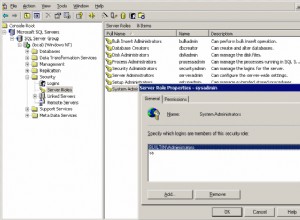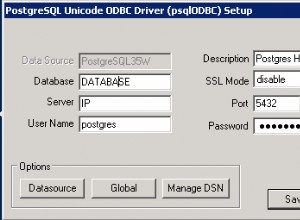experimentar
CREATE TABLE [dbo].[Names]
(
[Name] [nvarchar](64) NOT NULL,
[CreateTS] [smalldatetime] NOT NULL CONSTRAINT CreateTS_DF DEFAULT CURRENT_TIMESTAMP,
[UpdateTS] [smalldatetime] NOT NULL
)
PSI acha que um smalldatetime é bom o suficiente. Você pode decidir de forma diferente.
Você não pode fazer isso no "momento do impacto"?
No Sql Server, isso é comum:
Update dbo.MyTable
Set
ColA = @SomeValue ,
UpdateDS = CURRENT_TIMESTAMP
Where...........
Sql Server tem um tipo de dados "timestamp".
Mas pode não ser o que você pensa.
Aqui está uma referência:
https://msdn.microsoft.com/en-us/library/ms182776(v=sql.90).aspx
Aqui está um pequeno exemplo de RowVersion (sinônimo de timestamp):
CREATE TABLE [dbo].[Names]
(
[Name] [nvarchar](64) NOT NULL,
RowVers rowversion ,
[CreateTS] [datetime] NOT NULL CONSTRAINT CreateTS_DF DEFAULT CURRENT_TIMESTAMP,
[UpdateTS] [datetime] NOT NULL
)
INSERT INTO dbo.Names (Name,UpdateTS)
select 'John' , CURRENT_TIMESTAMP
UNION ALL select 'Mary' , CURRENT_TIMESTAMP
UNION ALL select 'Paul' , CURRENT_TIMESTAMP
select * , ConvertedRowVers = CONVERT(bigint,RowVers) from [dbo].[Names]
Update dbo.Names Set Name = Name
select * , ConvertedRowVers = CONVERT(bigint,RowVers) from [dbo].[Names]
Talvez um exemplo de trabalho completo:
DROP TABLE [dbo].[Names]
GO
CREATE TABLE [dbo].[Names]
(
[Name] [nvarchar](64) NOT NULL,
RowVers rowversion ,
[CreateTS] [datetime] NOT NULL CONSTRAINT CreateTS_DF DEFAULT CURRENT_TIMESTAMP,
[UpdateTS] [datetime] NOT NULL
)
GO
CREATE TRIGGER dbo.trgKeepUpdateDateInSync_ByeByeBye ON dbo.Names
AFTER INSERT, UPDATE
AS
BEGIN
Update dbo.Names Set UpdateTS = CURRENT_TIMESTAMP from dbo.Names myAlias , inserted triggerInsertedTable where
triggerInsertedTable.Name = myAlias.Name
END
GO
INSERT INTO dbo.Names (Name,UpdateTS)
select 'John' , CURRENT_TIMESTAMP
UNION ALL select 'Mary' , CURRENT_TIMESTAMP
UNION ALL select 'Paul' , CURRENT_TIMESTAMP
select * , ConvertedRowVers = CONVERT(bigint,RowVers) from [dbo].[Names]
Update dbo.Names Set Name = Name , UpdateTS = '03/03/2003' /* notice that even though I set it to 2003, the trigger takes over */
select * , ConvertedRowVers = CONVERT(bigint,RowVers) from [dbo].[Names]
A correspondência no valor "Nome" provavelmente não é sábia.
Experimente este exemplo mais convencional com um SurrogateKey
DROP TABLE [dbo].[Names]
GO
CREATE TABLE [dbo].[Names]
(
SurrogateKey int not null Primary Key Identity (1001,1),
[Name] [nvarchar](64) NOT NULL,
RowVers rowversion ,
[CreateTS] [datetime] NOT NULL CONSTRAINT CreateTS_DF DEFAULT CURRENT_TIMESTAMP,
[UpdateTS] [datetime] NOT NULL
)
GO
CREATE TRIGGER dbo.trgKeepUpdateDateInSync_ByeByeBye ON dbo.Names
AFTER UPDATE
AS
BEGIN
UPDATE dbo.Names
SET UpdateTS = CURRENT_TIMESTAMP
From dbo.Names myAlias
WHERE exists ( select null from inserted triggerInsertedTable where myAlias.SurrogateKey = triggerInsertedTable.SurrogateKey)
END
GO
INSERT INTO dbo.Names (Name,UpdateTS)
select 'John' , CURRENT_TIMESTAMP
UNION ALL select 'Mary' , CURRENT_TIMESTAMP
UNION ALL select 'Paul' , CURRENT_TIMESTAMP
select * , ConvertedRowVers = CONVERT(bigint,RowVers) from [dbo].[Names]
Update dbo.Names Set Name = Name , UpdateTS = '03/03/2003' /* notice that even though I set it to 2003, the trigger takes over */
select * , ConvertedRowVers = CONVERT(bigint,RowVers) from [dbo].[Names]




